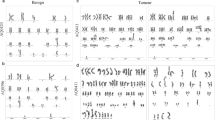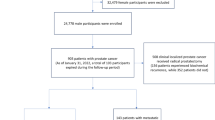Abstract
Molecular studies have suggested that ethnicity may play a significant role in prostate tumorigenesis, but no information exists for groups other than Caucasian or Japanese patients. We examined 62 archival samples of prostate tumours from Asians of non-Japanese origin for the over-expression of p53, for the possible presence of mutatedrasgenes, for the overexpression of the bcl-2 and bax proteins, as well as directly for the presence of apoptotic cells by the TUNEL methodology. Gene lesions of bothras(0%) and p53 (3%) were rare. While bcl-2 expression was not observed in any sample, bax expression was noted in 76% of samples and was associated with a significantly worse patient prognosis both overall (P< 0.005) and specifically in Chinese patients (P< 0.02). Apoptotic cells were found in 61% of samples, and were significantly associated with the presence of bax expression (P= 0.002), but not patient survival. These results suggest that prostate tumours from non-Japanese Asians are genetically distinct from prostate tumour found in both Japanese and Caucasian patients, and that treatment modalities may need to be tailored for specific population groups. © 2000 Cancer Research Campaign
Similar content being viewed by others
Article PDF
Change history
16 November 2011
This paper was modified 12 months after initial publication to switch to Creative Commons licence terms, as noted at publication
References
Anwar K, Nakakuki K, Shiraishi T, Naiki H, Yatani R and Inuzuka M (1992) Presence ofrasoncogene mutations and human papillomavirus DNA in human prostate carcinomas. Cancer Res 52: 5991–5996
Bauer JJ, Sesterhenn IA, Mostofi KF, McLeod DG, Srivastava S and Moul JW (1995) p53 nuclear protein expression is an independent prognostic marker in clinically localized prostate cancer patients undergoing radical prostatectomy. Clin Cancer Res 1: 1295–1300
Bauer JJ, Sesterhenn IA, Mostofi FK, McLeod DG, Srivastava S and Moul JW (1996) Elevated levels of apoptosis regulator proteins p53 and bcl-2 are independent prognostic biomarkers in surgically treated clinically localized prostate cancer. J Urol 156: 1511–1516
Bissonnette N, Wasylyk B and Hunting DJ (1997) The apoptotic and transcriptional transactivation activities of p53 can be dissociated. Biochem Cell Biol 75: 351–358
Bower M and Waxman J (1997) Gene therapy for prostate cancer. Semin Cancer Biol 8: 3–9
Chia KS, Lee HP, Seow A and Shanmugaratnam K (1996) Trends in Cancer Incidence in Singapore 1968–1992. Singapore Cancer Registry Report No 4,
Deppert W (1994) The yin and yang of p53 in cellular proliferation. Semin Cancer Biol 5: 187–202
Eastham JA, Stapleton AMF, Gousse AE, Timme TL, Yang G, Slawin KM, Wheeler TM, Scardino PT and Thompson TC (1995) Association of p53 mutations with metastatic prostate cancer. Clin Cancer Res 1: 1111–1118
Effert PJ, Neubauer A, Walther PJ and Liu ET (1992) Alterations of the P53 gene are associated with the progression of a human prostate carcinoma. J Urol 147: 789–793
Elnatan J, Goh HS and Smith DR 1996a) C-KI-RASactivation and the biological behaviour of proximal and distal colonic adenocarcinomas. Eur J Cancer 32A: 491–497
Elnatan J, Goh H-S and Smith DR 1996b) A comparison of the detection of activated c-Ki-rasgenes by mismatch specific oligonucleotide hybridisation analysis and enriched PCR in colorectal adenocarcinomas. Int J Oncology 8: 139–143
Furuya Y, Krajewski S, Epstein JI, Reed JC and Isaacs JT (1996) Expression of bcl-2 and the progression of human and rodent prostatic cancers. Clin Cancer Res 2: 389–398
Gavrieli Y, Sherman Y and Ben-Sasson SA (1992) Identification of programmed cell death in situ via specific labeling of nuclear DNA fragmentation. J Cell Biol 119: 493–501
Gleason DF (1977) Histological grading and clinical staging of prostate carcinoma. In Urologic Pathology: The Prostate, pp 171–197. Lea and Febiger: Philadelphia
Goh LG (1997) Future health issues and delivery needs of the elderly. Singapore Med J 38: 418–421
Greenblatt MS, Bennett WP, Hollstein M and Harris CC (1994) Mutations in the p53 tumor suppressor gene: clues to cancer etiology and molecular pathogenesis. Cancer Res 54: 4855–4878
Guillouf C, Rosselli F, Sjin RT, Moustacchi E, Hoffman B and Liebermann DA (1998) Role of a mutant p53 protein in apoptosis: characterization of a function independent of transcriptional trans-activation. Int J Oncol 13: 107–114
Gumerlock PH, Poonamallee UR, Meyers FJ and deVere White RW (1991) Activatedrasalleles in human carcinoma of the prostate are rare. Cancer Res 51: 1632–1637
Hsu S-M, Raine L and Fanger H (1981) Use of avidin-biotin-peroxidase complex (ABC) in immunoperoxidase techniques: a comparison between ABC and unlabeled antibody (PAP) procedures. J Histochem Cytochem 29: 577–580
Huang A, Gandour-Edwards R, Rosenthal SA, Siders DB, Deitch AD and White RW (1998) p53 and bcl-2 immunohistochemical alterations in prostate cancer treated with radiation therapy. Urology 51: 346–351
Johnson MI, Robinson MC, Marsh C, Robson CN, Neal DE and Hamdy FC (1998) Expression of Bcl-2, Bax, and p53 in high-grade prostatic intraepithelial neoplasia and localized prostate cancer: relationship with apoptosis and proliferation. Prostate 37: 223–229
Konishi N, Hiasa Y, Tsuzuki T, Tao M, Enomoto T and Miller GJ (1997) Comparison ofrasactivation in prostate carcinoma in Japanese and American men. Prostate 30: 53–57
Krajewska M, Krajewski S, Epstein JI, Shabaik A, Sauvageot J, Song K, Kitada S and Reed JC (1996) Immunohistochemical analysis of bcl-2, bax, bcl-X, and mcl-1 expression in prostate cancers. Am J Pathol 148: 1567–1576
Kuczyk MA, Serth J, Bokemeyer C, Machtens S, Minssen A, Bathke W, Hartmann J and Jonas U (1998) The prognostic value of p53 for long-term and recurrence-free survival following radical prostatectomy. Eur J Cancer 34: 679–686
Masuda M, Takano Y, Iki M, Asakura T, Hashiba T, Noguchi S and Hosaka M (1998) Prognostic significance of Ki-67, p53, and Bcl-2 expression in prostate cancer patients with lymph node metastases: a retrospective immunohistochemical analysis. Pathol Int 48: 41–46
Miyashita T and Reed JC (1995) Tumor suppressor p53 is a direct transcriptional activator of the human bax gene. Cell 80: 293–295
Miyashita T, Harigai M, Hanada M and Reed JC (1994) Identification of a p53-dependent negative response element in the bcl-2 gene. Cancer Res 54: 3131–3135
Moss SF, Scholes JV and Holt PR (1996) Abnormalities of epithelial apoptosis in multistep colorectal neoplasia demonstrated by terminal deoxyuridine nick end labeling. Dig Dis Sci 41: 2238–2247
Moul JW, Friedrichs PA, Lance RS, Theune SM and Chang EH (1992) InfrequentRASoncogene mutations in human prostate cancer. Prostate 20: 327–338
Ogura E, Senzaki H, Yammamoto D, Yoshida R, Takada H, Hioki K and Tsubura A (1999) Prognostic significance of Bcl-2, Bcl-xL/s, Bax and Bak expressions in colorectal carcinomas. Oncol Rep 6: 365–369
Oliveira C, Seruca R, Seixas M and Sobrinho-Simoes M (1998) The clinicopathological features of gastric carcinomas with microsatellite instability may be mediated by mutations of different “target genes”: a study of the TGFbeta RII, IGFII R, and BAX genes. Am J Pathol 153: 1211–1219
Orita M, Iwahana H, Kanazawa H, Hayashi K and Sekiya T (1989) Detection of polymorphisms of human DNA by gel electrophoresis as single-strand conformation polymorphisms. Proc Natl Acad Sci USA 86: 2766–2770
Shiraishi T, Muneyuki T, Fukutome K, Ito H, Kotake T, Watanabe M and Yatani R (1998) Mutations ofrasgenes are relatively frequent in Japanese prostate cancers: pointing to genetic differences between populations. Anticancer Res 18: 2789–2792
Shurbaji MS, Kalbfleisch JH and Thurmond TS (1995) Immunohistochemical detection of p53 protein as a prognostic indicator in prostate cancer. Hum Pathol 26: 106–109
Soong R and Iacopetta BJ (1997) A rapid and nonisotopic method for the screening and sequencing of p53 gene mutations in formalin-fixed, paraffin-embedded tumors. Mod Pathol 10: 252–258
Smith DR, Ji CY and Goh HS (1996) Prognostic significance of p53 overexpression and mutation in colorectal adenocarcinomas. Br J Cancer 74: 216–223
Stapleton AMF, Timme TL, Gousse AE, Li QF, Tobon AA, Kattan MW, Slawin KM, Wheeler TM, Scardino PT and Thompson TC (1997) Primary human prostate cancer cells harboring p53 mutations are clonally expanded in metastases. Clin Cancer Res 3: 1389–1397
Theodorescu D, Broder SR, Boyd JC, Mills SE and Frierson HF Jr (1997) p53, bcl-2 and retinoblastoma proteins as long-term prognostic markers in localized carcinoma of the prostate. J Urol 158: 131–137
Thibodeau SN, Bren G and Schaid D (1993) Microsatellite instability in cancer of the proximal colon. Science 260: 816–819
Thomas DJ, Robinson M, King P, Hasan T, Charlton R, Martin J, Carr TW and Neal DE (1993) p53 expression and clinical outcome in prostate cancer. Br J Urol 72: 778–781
Uchida T, Wada C, Shitara T, Egawa S and Koshiba K (1993) Infrequent involvement of p53 gene mutations in the tumorigenesis of Japanese prostate cancer. Br J Cancer 68: 751–755
Watanabe M, Ushijima T, Kakiuchi H, Shiraishi T, Yatani R, Shimazaki J, Kotake T, Sugimura T and Nagao M (1994) p53 gene mutations in human prostate cancers in Japan: different mutation spectra between Japan and western countries. Jpn J Cancer Res 85: 904–910
Wolter KG, Hsu YT, Smith CL, Nechushtan A, Xi XG and Youle RJ (1997) Movement of Bax from the cytosol to mitochondria during apoptosis. J Cell Biol 139: 1281–1292
Yagi OK, Akiyama Y, Nomizu T, Iwama T, Endo M and Yuasa Y (1998) Proapoptotic gene BAX is frequently mutated in hereditary nonpolyposis colorectal cancers but not in adenomas. Gastroenterology 114: 268–274
Author information
Authors and Affiliations
Rights and permissions
From twelve months after its original publication, this work is licensed under the Creative Commons Attribution-NonCommercial-Share Alike 3.0 Unported License. To view a copy of this license, visit http://creativecommons.org/licenses/by-nc-sa/3.0/
About this article
Cite this article
Chia, SJ., Tang, WY., Elnatan, J. et al. Prostate tumours from an Asian population: examination of bax, bcl-2, p53 and ras and identification of bax as a prognostic marker. Br J Cancer 83, 761–768 (2000). https://doi.org/10.1054/bjoc.2000.1355
Received:
Revised:
Accepted:
Published:
Issue date:
DOI: https://doi.org/10.1054/bjoc.2000.1355
Keywords
This article is cited by
-
Pathologic characteristics of prostatic adenocarcinomas: a mapping analysis of Korean patients
Prostate Cancer and Prostatic Diseases (2003)



